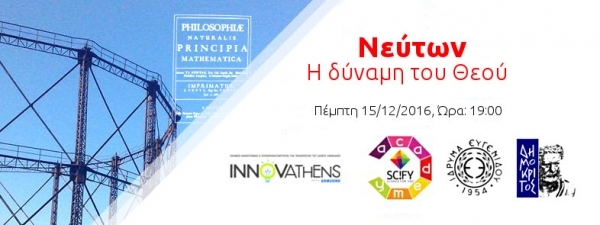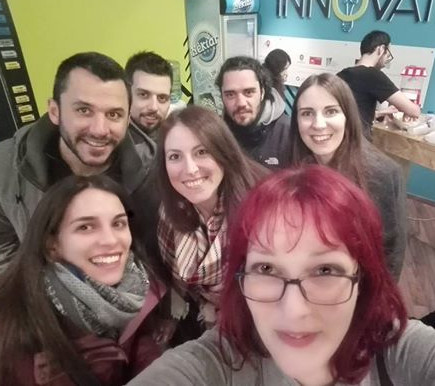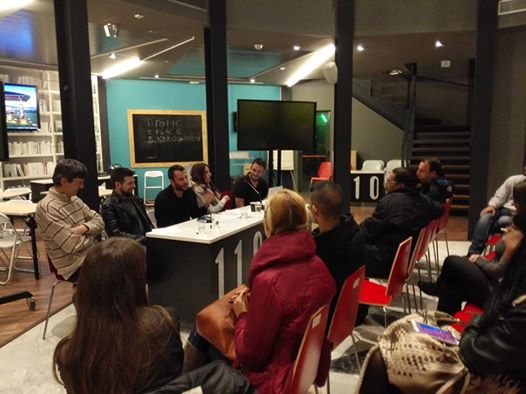
On Thursday, December 15th, the team of SciFY together with NCSR Demokritos and INNOVATHENS Innovation and Entrepreneurship Hub of the Technopolis City of Athens, organized the 16th SciFY Academy, where there was a screening of the dramatized documentary “Neuton, The Power of God”, produced by the Eugenides Foundation and directed by Panos Anestis. The screening was followed by a discussion with the documentary’s contributors and researchers of NCSR Demokritos.
In a Christmas and festive atmosphere, at the last SciFY Academy for 2016, students, young researchers, as well as people who wanted to learn about the life and work of Sir Isaac Newton came to watch the documentary “Newton, The Power of God” and to participate in the discussion about the stereotypes that exist for scientists and researchers, their interaction with society, and better ways to disseminate the results of science to the general public.

Dr. George Giannakopoulos opened the event by speaking about the partnership between NCSR Demokritos and SciFY and presented some projects that have resulted from this collaboration, such as Newsum and PServer.
Then, the screening of the documentary followed, accompanied by popcorn. Everyone was particularly interested in watching this excellent documentary since we had the opportunity to see lesser-known to the general public aspects of his work and personality.
Μετά το τέλος της προβολής, ακολούθησε η συζήτηση. Το πάνελ των ομιλητών αποτελούνταν από τους: Dr Γιώργος Γιαννακόπουλος Τεχνικός Διευθυντής στην SciFY & Researcher at the NCSR Demokritos‘s Institute of Informatics and Telecommunications, Leda Arnellou, Doctor of Science Communication at the University of Peloponnese, Dimitris Petakos, Ph.D. Candidate in History of Science at the National and Kapodistrian University of Athens, Panos Anestis, screenwriter/director, Historian of Science, and Ph.D. Candidate in the Department of Cinema at AUTH, and Vassilis Konstantoudis, Physicist, Ph.D. scholar, and Researcher at the NCSR Demokritos’s Microelectronics Institute.
Regarding the stereotypes that exist for scientists and researchers even nowadays, Mrs. Leda Arnellou characteristically mentioned the example of David Gijbels. In the early 80s, he went to schools and told the children to draw a scientist on a piece of paper. What the children drew was a man with a beard and a white robe, surrounded by objects such as test tubes, a skeleton, books, a computer, the DNA strand… Since then, the same experiment has been repeated with children and teenagers aged 5-19 in various countries of the world, and what’s been observed is that all of them, of all ages, all over the world, draw the same.
Regarding how stereotypes affect us, among other things, the speakers talked about how images affect us. Science is perceived as something outside of society. Children do not want to be scientists because it’s hard for them. The hierarchy between disciplines still exists today.
Regarding the role of women in science, Leda Arnellou mentioned that the scientist is always depicted as a man, and if the drawing is of a woman, it was drawn by a woman. Panos Anestis, the director of the documentary, said that in the film, the woman’s role is more psychoanalytical, as Newton’s mother left him and returned years later with more children.

When asked how scientists see themselves in society, Mr. Vassilis Konstantoudis, preferring the term researcher to the term scientist, said they see themselves as students who must leave arrogance and selfishness aside and come closer to society. He emphasized that the scientific methodology should become more socio-centric. Dr. George Giannakopoulos added that the research center is a community, like any community, with particularities, politics, and a working environment.
Later in the discussion, the need for a better connection between science and society was emphasized. Cooperation and interaction with other specialties and areas of society. An example mentioned by Mrs. Leda Arnellou is the zoonivesre , where everyone is given the opportunity to participate in research or to conduct their own. Also, Mr. Petakos mentioned that, historically, farmers, fishermen, and professionals in general had better know-how in their field than the researchers trying to study it. Dr. Giannakopoulos emphasized that trying to solve a problem without asking those who have it is a mistake. The particularities of a society need to be respected, and it is very important to identify the real needs and not create them.
In conclusion, Mr. Petakos emphasized that the scientist’s responsibility is to study correctly. Mrs. Arnellou mentioned that the internet is an ocean of information in which there is also misinformation, so in the future, it will be necessary to have tools and criteria to check facts from various sources.
A big thank you to all the speakers and the documentary contributors that attended the event, to INNOVATHENS, and all who attended and participated in the seminar, asking interesting questions and once again contributing to the realization of our vision for the free diffusion of knowledge!
To stay informed about upcoming SciFY events, you can register here.



